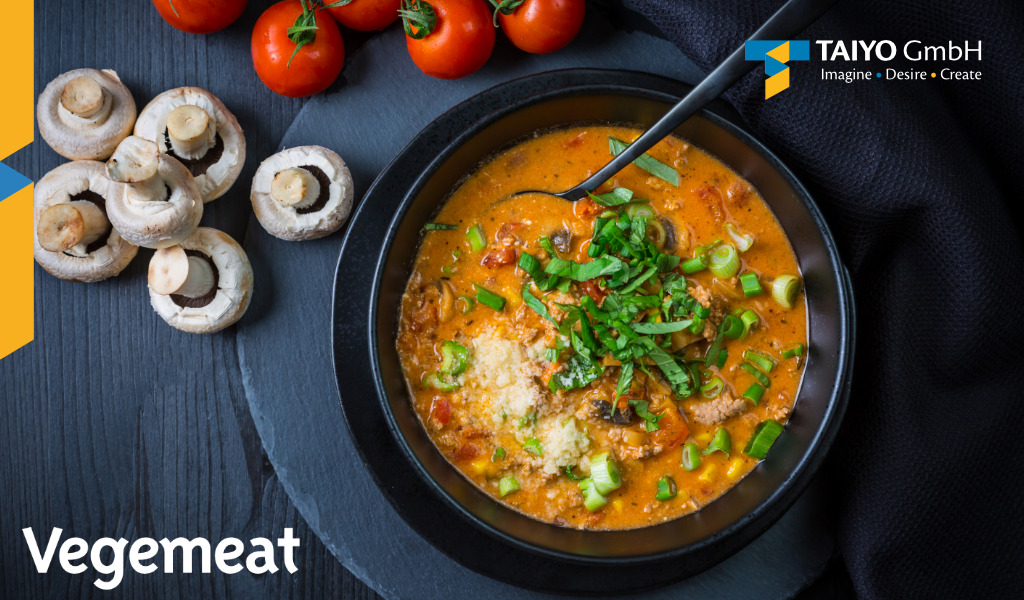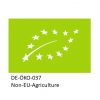Vegetarian or vegan alternatives to animal products can no longer be overlooked on supermarket shelves. In Germany, around seven million people already eat a vegetarian diet, more than one percent of the population even lives vegan, and more and more consumers are calling themselves flexitarians. However, the desire of many people for plant-based alternatives that have a meat-like structure, natural ingredients and, above all, convincing taste, poses challenges for the food industry. Taiyo is an expert in functional ingredients and supplies Vegemeat, a plant-based meat alternative made from pea protein. The granules are 100 percent natural, free of additives and preservatives, and also allergen-free: perfect for soups, bolognese, lasagnas and the like.
Meat alternatives are more popular than ever: according to Markets and Markets, the U.S. plant-based meat market is expected to generate $8.3 billion in sales by 2025 (1). Consumers looking for plant-based meat alternatives will find a wide range of products with a wide variety of ingredients, flavors and textures. As demand increases, the focus of consumers is also shifting: products should not only be meat-free, natural, healthy and sustainable, but above all convincing in terms of taste and consistency. If the product meets all these criteria, it will gain popularity not only among vegans or vegetarians, but also among a broader consumer group. The challenge: Many consumers expect a meat-like texture in order to switch to alternatives. But to achieve the typical mouthfeel and meat-like bite, many vegan products are loaded with a number of different additives and are often highly processed. Most of them are also not tailored to the specific nutritional needs of vegetarians or vegans.
Vegemeat from Taiyo convinces as a natural meat alternative based on pea protein. Due to the mincemeat-like texture and the spicy taste, it can be used in dishes such as bolognese or lasagna, among others. Vegemeat is an all-natural, vegan pea protein granule without the typical inherent flavor, masking off-notes with special flavors is not required. As a dry product, Vegemeat offers the advantage that it does not require refrigeration and has a long shelf life without the use of preservatives. Storage is thus conceivably simple.
Special advantages of Vegemeat pea protein granules are the high protein content of 78 percent, the spicy taste and the pleasant consistency. It is also free of preservatives and contains only 5.5 percent carbohydrates. Since no sugar is added, the carbohydrate value of 5.5 g is also pleasingly low. In total, Vegemeat contains only four ingredients: Pea protein, strawberry juice concentrate, salt and glucomannan – a fiber from konjac root. Vegemeat is perfect for those who prefer a meat-free, balanced diet. Manufacturers or distributors of meat alternatives or instant soups can obtain Vegemeat in various packaging and container sizes. Visitors to Vitafoods 2022 in Geneva were also able to see this for themselves. Managing Director Dr. Stefan Siebrecht: “We were overwhelmed by the huge interest in Vegemeat. So this trade fair in particular showed that enjoyment and nutrition with added health value can go hand in hand.”
Often criticized: Soy-based substitute products
Soy-based products are still among the most popular meat alternatives and are considered nutritious and healthy due to their high protein content.However, the topic of soy is often met with criticism: Its cultivation entails extensive deforestation and clearing of the rainforest and thus destruction of natural vegetation. It is also associated with water pollution due to intensive agricultural practices. As a result, soy products that meet sustainable production standards and are free of genetically modified organisms (GMOs) are not available in sufficient quantities. While soy is a plant-based protein source with a complete amino acid profile, that is the only real advantage it has over many other alternatives (2). A very high quality, safe, and palatable protein source is the yellow pea – which, unlike soy, is a plant native to Europe. Peas are known to have an exceptionally high protein content. Pea protein is also FODMAP-friendly and allergen-free. Pea protein powder contains all nine essential amino acids – which the body cannot produce on its own. However, its high content of branched-chain amino acids is particularly noteworthy. The content of the muscle-building superstars leucine, isoleucine and valine in particular is exceptionally high. And: heir protein is rich in arginine, another important building block for performance in training (3).
If you would like more information about Taiyo’s Vegemeat, please do not hesitate to contact us!
References:
(1) www.grandviewresearch.com
(2) Al-Wahsh IA, Horner HT, Palmer RG, Reddy MB, Massey LK. Oxalate and phytate of soy foods. J Agric Food Chem. 2005 Jul 13;53(14):5670-4. doi: 10.1021/jf0506378. PMID: 15998131.
(3) Babault N, Païzis C, Deley G, Guérin-Deremaux L, Saniez MH, Lefranc-Millot C, Allaert FA. Pea proteins oral supplementation promotes muscle thickness gains during resistance training: a double-blind, randomized, Placebo-controlled clinical trial vs. Whey protein. J Int Soc Sports Nutr. 2015 Jan 21;12(1):3. doi: 10.1186/s12970-014-0064-5. PMID: 25628520; PMCID: PMC4307635.
Picture source: Shutterstock | Ingrid Balabanova






